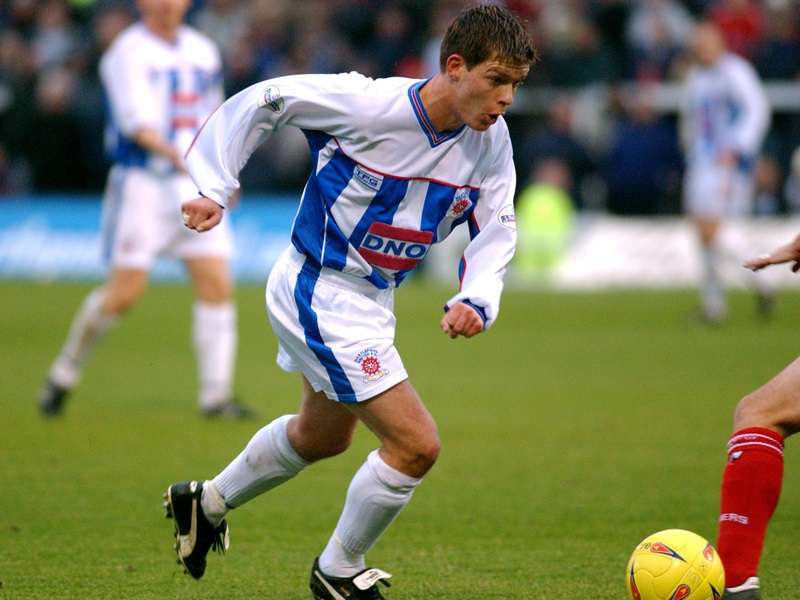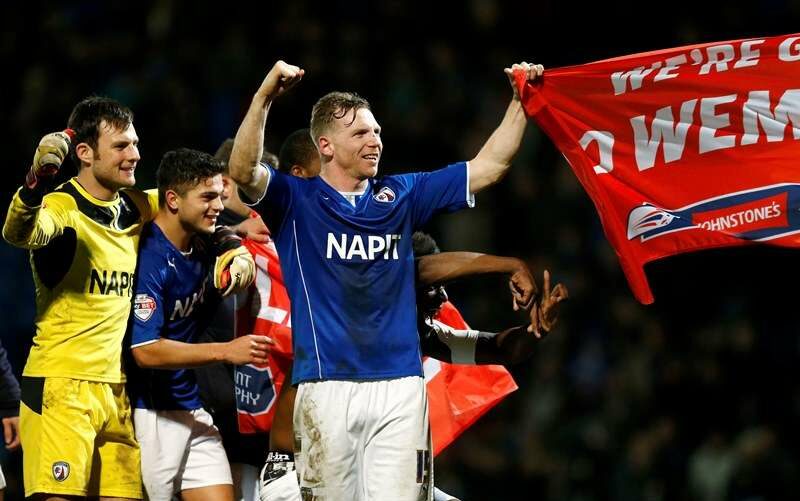by Chris Dunlavy
AS a teenager at Sheffield Wednesday, Ritchie Humphreys was famously labelled “the next Marco van Basten” by an admiring Johan Cruyff.
A debut at 17, a slew of spectacular strikes, mentored by Chris Waddle, it seemed the childhood Blades fan was set for superstardom. If the subsequent 20 years didn’t quite live up to that sky-high billing, the Chesterfield veteran has still forged a career that would make any player proud.
A whopping 733 games, 54 goals, three promotions and, of course, legendary status at Hartlepool United, the club he graced for more than a decade.
Now PFA chairman and still slogging away for the Spireites at 38, he looks back over his two decades in the game and recalls the highs, the lows… and the day his big moment was ruined by David Beckham.
First Club
Sheffield Wednesday. I left school in ‘94 and went there to do my YTS. I made my [full] debut in ‘96.
I actually grew up a Sheffield United fan and was on the books there until I was about 13. They let me and Kevin Davies go on exactly the same day. He went to Chesterfield, I went back to Sunday football and, thankfully, got picked up by Wednesday.
I actually made my full home debut on the day David Beckham scored against Wimbledon from the halfway line. I scored a really good goal that day, as well. It got nominated for Goal of the Month but obviously didn’t stand a chance against that!
I made a really good start. I scored three in my first four games, two of them among the best I’ve ever scored, and after the first month of the season Wednesday were top of the Premier League. It gave me great confidence.
Best manager
Paul Cook was great for me, but I’ve worked under my current manager Danny Wilson three times now and he’s someone I’ve really grown to respect.
I was a young lad at Wednesday and didn’t really think about it too much. But at Hartlepool I was a bit older, doing my coaching badges, and I learned a lot about how to handle players, different coaching methods and all the subtle little things that make up management.
He’s very professional, very focused on how to get results. And, like any manager, he doesn’t often lose his temper, but, when he does, you certainly know about it!
Best team-mate
When I first got into the Wednesday team, the spine of that side was phenomenal. Des Walker, David Hirst, Chris Waddle, John Sheridan.
The names speak for themselves. They all had hundreds of top-flight games, they were all internationals. To see how they trained and how they produced on a match day was a brilliant grounding.
Chris Waddle, for me, is one of the greatest talents this country has ever produced. What he couldn’t do with a ball wasn’t worth knowing.
Des Walker was one of the best defenders we’ve ever had. David Hirst scored more than 100 goals for the club.
Technically, Shez was peerless. I played against him at Oldham towards the end of his career and he was still picking out passes that nobody had even thought of, let alone had time to see. If you made a run, he would find you. And, if you needed to get stuck in, he’d do that as well.
First promotion
Hartlepool in 2002-03. I’ve got brilliant memories of that. Not just the success, but the way it happened. The year before, we’d reached the League Two play-offs and the semi against Cheltenham came down to penalties. I was the one who missed the final penalty.
It’s the last kick of the season and you feel you’ve let everyone down – team-mates, management, staff. It’s a horrible feeling I wouldn’t wish on anyone. That summer was awful.
But we came back really strong, led the league for most of the year and I ended up getting 11 goals and winning player of the year. The spirit in that side was immense and it lives on to this day because we’re all still in touch.
Funniest player
One of my best mates in football is Darrell Clarke, the Bristol Rovers manager. We signed for Hartlepool on the same day in 2001, along with Tommy Widdrington and Jon Bass, and lived in digs together.
He’s a really funny guy, brilliant to have around the changing room and it’s no surprise he’s doing well in management because he’s exceptional with people.
I’ve got to mention Ian Dunbavin, too. He came on loan to Chesterfield from Accrington the year we won the league. Whenever you were lost or needed a lift, he was the bloke who’d offer.

Funniest incident
After an away game for Hartlepool, I can’t remember where. We were going for the play-offs and we’d conceded a really daft late goal, to lose. Everyone was furious, the manager was ranting and raving. Michael Nelson, our centre-back, got up and had a few words. As he’s turned to go, he’s chucked a Powerade bottle – one of those ones that’s soft at the bottom and hard at the top – and the cap caught our keeper, Dimi Konstantopoulos, on the bridge of the nose.
He went down like he’d been shot, cursing away in a mixture of Greek and English. It was hilarious and completely broke the tension. You just thought ‘Why are we taking ourselves so seriously?’
Biggest achievement
I’ve had three promotions and three England Under-21 caps. I scored on my full Premier League debut. I was named PFA chairman. Those are all stand-outs.
But, looking back, managing to play professionally for 20 years is the thing I’ll look back on with the most pride. I’ve done 730-odd games and it’s something I try to pass on to the younger players. Yes, you need ability, but your coaches and managers can’t look after you at home. Take care of your body and you’ll get the rewards.
Lowest moment
Relegation, without doubt. I went down with Wednesday and with Hartlepool twice. Obviously it has personal costs.
People look at your stats and think ‘Do we want a guy with relegations on his CV?’ I could accept it if the club decided to let me go or gave me a pay-cut, but staff could lose their jobs. YTS players might not get taken on. Your mate sitting beside you in the dressing room might not get his contract renewed. People have families, bills, mortgages. The fans could think ‘I’m not watching this lot next season’. I’d played a lot those seasons and I felt personally responsible.
Toughest place to go
Old Trafford in the late 90s. You could put in your best performance of the season and still lose by a cricket score. The players they had, Giggs, Scholes, Beckham, Keane, were just too strong.
The other one is a ground I’ve played at so many times I’ve lost count – Scunthorpe. I just couldn’t get a result there. Even the day we clinched promotion with Hartlepool, we lost 4-1 at Glanford Park. It was the most bizarre feeling.
Toughest opponent
Another hark back to the Premier League days, it has to be Sol Campbell and Tony Adams. I was a young striker learning the game and they were big, strong veterans who knew every trick in the book. Good on the ball, good in the air, loved a physical battle. I’ve got a few pictures of myself up against them and it looks like a boy playing men’s football! I never got any change out of them.
Favourite place to go
Even though I lost, I’ve got to say Wembley. I’d never played there until Chesterfield reached the JPT final in 2014. I was 36.
It had always been my dream, and walking out with the national anthems and the fireworks and all the ceremony was a lifelong ambition ticked off. We lost 3-1 to Peterborough but, for us, the ultimate aim was promotion and we ended up winning the League Two title. I’d been promoted twice but never won a trophy, so that was another first that came really late.
Ambition
I’d like to play for as long as I can. Beyond that, I just want to stay fit and healthy. I’ve got my A-licence, I’ve done my applied management course. Through my role at the PFA , we encourage lads to get some education – and that’s what I’ve done.
It’s not easy to break into coaching, but I’ve been in dressing rooms since I was 16 and don’t want that to end with my playing career.
















